
Meet our research team
Our CATALYST team includes more than 20 staff members – including clinical research associates, project managers, post-doctoral researchers, research specialists and scientists, and research administrators and directors – working in collaboration with dozens of faculty members across The Ohio State University. We are only able to achieve our mission, vision, and values through the work of our outstanding faculty, collaborators and staff.
When asked about their work with CATALYST, some of our team members offered the following responses:
"Working with CATALYST is enjoyable and rewarding. Team members are valued, respected, productive and focused on ensuring our work yields impactful outcomes for those we seek to serve."
"As someone who has always worked in collaborative structures, I've never seen anything quite like CATALYST. The culture is one that truly fosters collaboration. Deep value is placed on bringing in different perspectives, using dialogue and healthy communication to bring impactful discovery to fruition."
"CATALYST is like a warm hug, and working with CATALYST helped me fall in love with research again."

CATALYST leadership
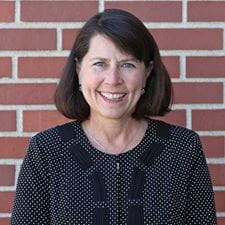 Dr. McAlearney is the Executive Director of CATALYST, Associate Dean for Health Services Research, and Distinguished Professor in the Department of Family and Community Medicine in Ohio State's College of Medicine. She also holds appointments as a professor of health services management and policy in the College of Public Health and professor of pediatrics in the College of Medicine at The Ohio State University. She has over 30 years of health services research experience and has been actively involved in both performing research and disseminating research results to academic and practitioner audiences.
Dr. McAlearney is the Executive Director of CATALYST, Associate Dean for Health Services Research, and Distinguished Professor in the Department of Family and Community Medicine in Ohio State's College of Medicine. She also holds appointments as a professor of health services management and policy in the College of Public Health and professor of pediatrics in the College of Medicine at The Ohio State University. She has over 30 years of health services research experience and has been actively involved in both performing research and disseminating research results to academic and practitioner audiences.
Dr. McAlearney enjoys collaborative research projects and engaging clinicians in health service research as well as mentoring junior faculty in their research endeavors. She has authored over 200 peer-reviewed publications, 10 books/edited books and 80 book chapters. Dr. McAlearney’s ongoing research focuses on information technology innovations in health care, population health management, quality improvement and organizational development, and she is an expert in both qualitative and mixed methods analyses. Dr. McAlearney received her undergraduate and graduate degrees from Stanford University and Harvard University’s T. H. Chan School of Public Health.
View full profile View publications
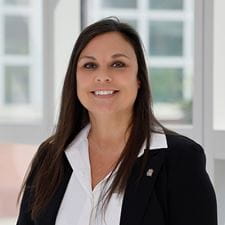 Alice Gaughan is the Associate Director of CATALYST at The Ohio State University. She drives health services and implementation sciences research administration, strategy development, and operations at CATALYST. With more than 20 years of experience performing research at Ohio State, she has an extensive background in building strong relationships leading to successful collaborations between health care and research teams. She is passionate about maintaining a positive work environment to support the success of all team members and is a member of the College of Medicine and University Staff advisory committees.
Alice Gaughan is the Associate Director of CATALYST at The Ohio State University. She drives health services and implementation sciences research administration, strategy development, and operations at CATALYST. With more than 20 years of experience performing research at Ohio State, she has an extensive background in building strong relationships leading to successful collaborations between health care and research teams. She is passionate about maintaining a positive work environment to support the success of all team members and is a member of the College of Medicine and University Staff advisory committees.
Alice received a Bachelor of Science degree in biology from Bethany College, a Master of Science degree in medical microbiology and immunology from Ohio State, and a Professional Certificate in Management from the Mendoza College of Business at the University of Notre Dame.
CATALYST research staff
 Dan Gilmore, PhD, RDN/L is a postdoctoral scholar in CATALYST and is a registered dietitian nutritionist. His doctoral work focused on optimizing community healthcare services for adults with developmental disabilities. He is presently engaged in a variety of health services research projects involving collaboration between the healthcare and social needs systems, and has additional research interests in improving nutrition-related outcomes among people with disabilities.
Dan Gilmore, PhD, RDN/L is a postdoctoral scholar in CATALYST and is a registered dietitian nutritionist. His doctoral work focused on optimizing community healthcare services for adults with developmental disabilities. He is presently engaged in a variety of health services research projects involving collaboration between the healthcare and social needs systems, and has additional research interests in improving nutrition-related outcomes among people with disabilities.
Before beginning his graduate education, he worked as a clinical dietitian at a community primary care clinic in Columbus, Ohio. Dr. Gilmore completed his bachelor’s, master’s, and PhD at The Ohio State University in the School of Health and Rehabilitation Sciences. He has a passion for mentorship and tea.
 Dr. Hu is a postdoctoral scholar with CATALYST who is engaged in the fields of health communication. Her primary research interests focus on negative cognitive biases and emotion regulation strategies in individuals experiencing symptoms of depression or generalized anxiety disorder. She is particularly interested in how these factors influence the way an individual’s digital environment is shaped by self-selection and the resulting mental health outcomes. Dr. Hu’s work also focuses on patients' experiences with Long COVID and the implementation of evidence-based interventions to reduce suicide. She earned her MA from Indiana University, Bloomington, and her PhD from The Ohio State University, both in communication.
Dr. Hu is a postdoctoral scholar with CATALYST who is engaged in the fields of health communication. Her primary research interests focus on negative cognitive biases and emotion regulation strategies in individuals experiencing symptoms of depression or generalized anxiety disorder. She is particularly interested in how these factors influence the way an individual’s digital environment is shaped by self-selection and the resulting mental health outcomes. Dr. Hu’s work also focuses on patients' experiences with Long COVID and the implementation of evidence-based interventions to reduce suicide. She earned her MA from Indiana University, Bloomington, and her PhD from The Ohio State University, both in communication.
 Dr. Kim is a postdoctoral scholar in CATALYST. Her research is dedicated to enhancing the quality of care for infants and children. Her doctoral work focused on nurse workload and the quality of nursing care for infants experiencing substance withdrawal in neonatal intensive care units. Currently, Dr. Kim is engaged in health services research projects concerning maternal and infant health. She earned her PhD from the College of Nursing at The Ohio State University and holds both a master’s and a bachelor’s degree in nursing science from Ewha Womans University in South Korea. Before pursuing her doctorate, she gained extensive experience as a pediatric nurse at Asan Medical Center in South Korea.
Dr. Kim is a postdoctoral scholar in CATALYST. Her research is dedicated to enhancing the quality of care for infants and children. Her doctoral work focused on nurse workload and the quality of nursing care for infants experiencing substance withdrawal in neonatal intensive care units. Currently, Dr. Kim is engaged in health services research projects concerning maternal and infant health. She earned her PhD from the College of Nursing at The Ohio State University and holds both a master’s and a bachelor’s degree in nursing science from Ewha Womans University in South Korea. Before pursuing her doctorate, she gained extensive experience as a pediatric nurse at Asan Medical Center in South Korea.
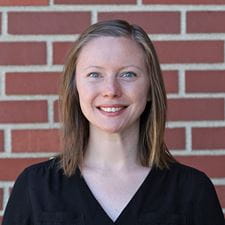 Dr. Swoboda is a research scientist in the Department of Family and Community Medicine. Her research interests include behavior change interventions for chronic disease prevention and treatment, and the effects of health behaviors on risk reduction. Her current research involves improving data collection and reporting for community-level infant mortality prevention programs across Ohio. Dr. Swoboda received her PhD from The Ohio State University in human nutrition and her Master of Science from SUNY University at Buffalo.
Dr. Swoboda is a research scientist in the Department of Family and Community Medicine. Her research interests include behavior change interventions for chronic disease prevention and treatment, and the effects of health behaviors on risk reduction. Her current research involves improving data collection and reporting for community-level infant mortality prevention programs across Ohio. Dr. Swoboda received her PhD from The Ohio State University in human nutrition and her Master of Science from SUNY University at Buffalo.
Dr. Thomas received her PhD in public policy and management and MS in mathematics from The Ohio State University, and she earned a BA in mathematics and philosophy from Boston University. Before joining CATALYST, she did research for Children’s Defense Fund-Ohio and Ohio State’s Office of Research.
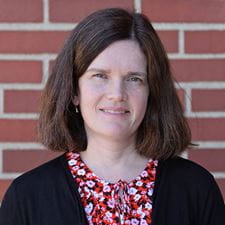 Alison is a Research Specialist for CATALYST. She received a Master of Science in Information degree from the University of Michigan, a Master of Public Health degree from Wright State University, and a BA in psychobiology from Hiram College. Alison brings prior experience as an academic health sciences librarian, outreach coordinator, and clinical informationist. Her research interests include implementation science and the dissemination of evidence-based health care practices. Alison provides research and publication support for CATALYST, as well as project management support for the COSTARS project. She previously served as the implementation science program coordinator for the HEALing Communities Study in Ohio.
Alison is a Research Specialist for CATALYST. She received a Master of Science in Information degree from the University of Michigan, a Master of Public Health degree from Wright State University, and a BA in psychobiology from Hiram College. Alison brings prior experience as an academic health sciences librarian, outreach coordinator, and clinical informationist. Her research interests include implementation science and the dissemination of evidence-based health care practices. Alison provides research and publication support for CATALYST, as well as project management support for the COSTARS project. She previously served as the implementation science program coordinator for the HEALing Communities Study in Ohio.
Sadie is a research specialist with expertise in qualitative research and project management in health care and public health. She has experience serving as a project manager on large-scale, multi-site qualitative studies. Her expertise includes interviewing, qualitative data analysis, and literature reviews.
Sadie holds a Master of Library and Information Science from Kent State University, and she completed her graduate practicum at Mount Carmel West Health Sciences Library in Columbus. Sadie earned her bachelor’s degree in art history and international relations from Centre College in Danville, Ky.
Lindsey received her Master of Public Health from The Ohio State University. She is a research specialist for CATALYST and is responsible for overseeing daily operations of studies as well as supervising research staff and students. Lindsey brings prior expertise as a research assistant in both academic and practice settings. She provides project management for the team’s MEDTAPP projects and MyChart/patient portals research activities. She previously acted as the implementation lead for HT2 and provided project management for the Patient-Centered Outcomes Research Institute (PCORI) Taxonomy Project.
 Lauren is the education resource specialist for CATALYST. Lauren's background is in public education, where she collaborated with teams to connect learners with diverse needs to the resources needed to access their education. Lauren is passionate about collaborating with others to help create and improve systems aimed to produce better outcomes for all stakeholders. She received her Bachelor Of Science in Education degree from Bowling Green State University and earned her Master of Education degree from Xavier University.
Lauren is the education resource specialist for CATALYST. Lauren's background is in public education, where she collaborated with teams to connect learners with diverse needs to the resources needed to access their education. Lauren is passionate about collaborating with others to help create and improve systems aimed to produce better outcomes for all stakeholders. She received her Bachelor Of Science in Education degree from Bowling Green State University and earned her Master of Education degree from Xavier University.
 Mireille is a Clinical Research Assistant with CATALYST in The Ohio State University College of Medicine and has a passion for research focused on improving health outcomes for marginalized populations. She earned a BA in history from Centre College and is pursuing a master's degree in human resource management at Ohio State. Her research interests lie at the intersection of Black maternal and child health, looking at food as medicine, and considering financial literacy to address health disparities and promote well-being in underserved communities. Her roles include recruiting study participants, assisting with interviewing, transcribing interviews, and supporting qualitative analysis for numerous CATALYST projects.
Mireille is a Clinical Research Assistant with CATALYST in The Ohio State University College of Medicine and has a passion for research focused on improving health outcomes for marginalized populations. She earned a BA in history from Centre College and is pursuing a master's degree in human resource management at Ohio State. Her research interests lie at the intersection of Black maternal and child health, looking at food as medicine, and considering financial literacy to address health disparities and promote well-being in underserved communities. Her roles include recruiting study participants, assisting with interviewing, transcribing interviews, and supporting qualitative analysis for numerous CATALYST projects.
CATALYST faculty collaborators
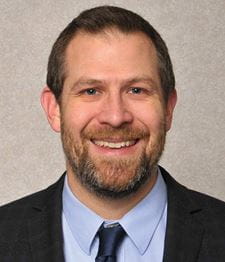 Dr. Brock is an Associate Professor in the Department of Biomedical Informatics at The Ohio State University and the Associate Director of the Center for Biostatistics. He leads the Biostatistics, Epidemiology, and Research Design (BERD) Core of the Center for Clinical Translational Science (CCTS) and is the Director of the Biostatistics Resource at Nationwide Children's Hospital.
Dr. Brock is an Associate Professor in the Department of Biomedical Informatics at The Ohio State University and the Associate Director of the Center for Biostatistics. He leads the Biostatistics, Epidemiology, and Research Design (BERD) Core of the Center for Clinical Translational Science (CCTS) and is the Director of the Biostatistics Resource at Nationwide Children's Hospital.
Dr. Brock's methodological research funded by the National Institutes of Health includes multistate transition models, competing risks, and statistical bioinformatics (cluster validation, data integration, and missing value imputation). He has partnered with CATALYST faculty to develop multiple studies ranging from early phase trials to community-based pragmatic interventions incorporating both efficacy and implementation outcomes. He is also active in using secondary data for research, including claims data, electronic medical records, cohort studies, and registry data.
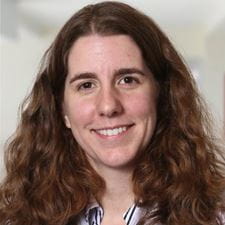 Dr. Hebert is an associate professor appointed in the Department of Biomedical Informatics and continues to practice clinical medicine as an attending physician in the Division of Infectious Diseases in the Department of Internal Medicine. In addition to these roles, she also serves as the co-chair of the Department of Biomedical Informatics Graduate Studies Coordinating Committee and leads all clinical informatics and public health informatics educational efforts for the department. Her research focuses on the secondary use of electronic health record (EHR) data for research and quality improvement.
Dr. Hebert is an associate professor appointed in the Department of Biomedical Informatics and continues to practice clinical medicine as an attending physician in the Division of Infectious Diseases in the Department of Internal Medicine. In addition to these roles, she also serves as the co-chair of the Department of Biomedical Informatics Graduate Studies Coordinating Committee and leads all clinical informatics and public health informatics educational efforts for the department. Her research focuses on the secondary use of electronic health record (EHR) data for research and quality improvement.
She has also used EHR data to study the effect of epidemiologic context on antimicrobial prescribing, as well as to develop a novel way to represent microbiology susceptibility data to enable decision support. Dr. Hebert received her MD from The Ohio State University in 2005 and a Master of Science in public health with a specialization in biomedical informatics from The Ohio State University in 2013.
Dr. Rahurkar is a health services researcher and informatician with a focus on using health information technologies to draw actionable insights from big data collected during clinical care as well as public health practices to improve health care outcomes and inform policy. This includes building specialized registries using electronic health record data to facilitate research. Further, he has leveraged the latest in data sharing standards – Fast Healthcare Interoperability Resources (FHIR) – to implement and evaluate FHIR-based apps in the emergency department and primary care setting across several discrete EHR systems. At Ohio State, he works closely with the team that leads the implementation of the FHIR standard at the Ohio State Wexner Medical Center making this resource available to other researchers across the university.
Dr. Rahurkar is an assistant professor in the Department of Biomedical Informatics and a core faculty member with CATALYST. Before coming to Ohio State, Dr. Rahurkar was a public and population health informatics fellow in the Center for Biomedical Informatics at the Regenstrief Institute in Indianapolis. He received his Doctor of Public Health in Health Services Research from the University of Alabama at Birmingham. Additionally, he is a trained dental surgeon.
Dr. Tounkara is an Assistant Professor in the Department of Biomedical Informatics at The Ohio State University. As a biostatistician, his expertise includes statistical methods for clustered and correlated data. His PhD thesis involved the development of a new statistical model framework for analyzing clustered binary data, while his postdoctoral research in statistical genetics at McGill University involved the development of a flexible model to analyze secondary phenotypes from data collected through case-control, extreme-trait, and multiple-trait designs. He received his PhD from Université Laval in Quebec, Canada.
Before joining the Ohio State University, Dr. Tounkara was an Assistant Professor within the Department of Statistical Sciences at the University of Toronto, where he taught undergraduate and graduate courses in statistics including regression analysis, statistical theory, survey analysis, and sampling techniques. He also held a position as a biostatistician in the Lunenfeld Tanenbaum Research Institute at the University of Toronto, where he used the copula approach for modeling cancer risk in Hereditary Breast Cancer Syndrome families. His current work includes a machine learning (high-dimensional statistics) project to develop statistical approaches that can properly handle predictors with weak signals in high-dimensional data.
Dr. Johnson is a professor with the Department of Educational Studies in The Ohio State University College of Education and Human Ecology as well as the Director of Faculty Development for the college. Dr. Johnson’s interests are broadly situated in interrogating education and health care systems as it relates to addressing social determinants of health (SDOH) needs, equity, access, and justice. Her research is focused particularly in relation to the influence of SDOH for historically marginalized Black and Brown people across the lifespan. Within this research, she contributes to knowledge about: (1) provider training needs; (2) equity issues in SDOH intervention, assessment, and screening approaches; and (3) the cumulative impact of SDOH needs on the well-being and mental health of youth and transitional aged adults.
Dr. Johnson earned her bachelor's degree in psychology from Norfolk State University, her MEd in counseling psychology from Howard University, and her PhD in counselor education and supervision from the Pennsylvania State University. She previously held a position as a tenured faculty member in the Department of Counseling and Special Education at Virginia Commonwealth University. She is also the recipient of the 2023 David K. Brooks, Jr. Distinguished Mentor Award from the American Counseling Association.
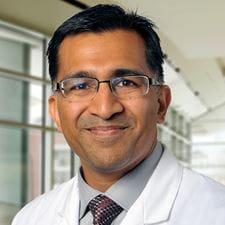 Dr. Panchal is a professor of emergency medicine with the Department of Emergency Medicine. He is passionate about improving patient outcomes in the prehospital setting and conducts research focused on prehospital airway management and improving outcomes from cardiac arrest. He began his career as a researcher completing a PhD in cardiovascular physiology at Case Western Reserve University. Following this, at The Ohio State University College of Medicine, he completed his medical training and residency.
Dr. Panchal is a professor of emergency medicine with the Department of Emergency Medicine. He is passionate about improving patient outcomes in the prehospital setting and conducts research focused on prehospital airway management and improving outcomes from cardiac arrest. He began his career as a researcher completing a PhD in cardiovascular physiology at Case Western Reserve University. Following this, at The Ohio State University College of Medicine, he completed his medical training and residency.
At Ohio State, he is the program director for the ACGME-accredited EMS fellowship. On a national level, he is the research and fellowship director for the National Registry of Emergency Medical Technicians and is part of the expert panels for the National EMS Scope of Practice Model Revision Project and the Evidence-Based Guideline for Naloxone. He also is a member of the American Heart Association Emergency Cardiovascular Care Scientific Subcommittee and is the chair of the 2018 AHA/ECC Guidelines Focused Update for Cardiopulmonary Resuscitation and Emergency Cardiovascular Care.
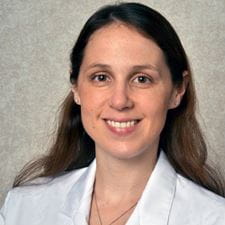 Dr. Southerland is a Clinical Associate Professor in the Department of Emergency Medicine and the Director of Clinical and Implementation Research for Emergency Medicine. Dr. Southerland's research focuses on geriatric emergency medicine, fall risk, and safe transitions of care from the Emergency Department. Her current work includes studying how implementing geriatric screening tools into the Emergency Department can improve patient outcomes, an effort funded by the National Institute on Aging.
Dr. Southerland is a Clinical Associate Professor in the Department of Emergency Medicine and the Director of Clinical and Implementation Research for Emergency Medicine. Dr. Southerland's research focuses on geriatric emergency medicine, fall risk, and safe transitions of care from the Emergency Department. Her current work includes studying how implementing geriatric screening tools into the Emergency Department can improve patient outcomes, an effort funded by the National Institute on Aging.
Dr. Southerland serves in the community as the medical representative for a Franklin County interdisciplinary team focused on preventing elder abuse and neglect. Her role also includes mentoring medical students and residents in emergency medicine research and geriatrics, and she works with graduate students pursuing an Interdisciplinary Certificate in Aging. Dr. Southerland earned her MD at the Duke University School of Medicine, where she also completed her internship and residency.
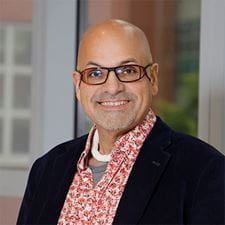 Dr. Huerta is the Chief Research Information Officer for The Ohio State University Wexner Medical Center and the Ohio State College of Medicine as well as a Professor in the Department of Family and Community Medicine and the Department of Biomedical Informatics. He brings to CATALYST both breadth and depth of experience in quantitative methods, implementation science, health services research and multidisciplinary collaboration. Dr. Huerta is a well-published, nationally recognized expert in the use of survey data to advance discovery and has been published in a diverse set of journals. Dr. Huerta also has a long history of engaging clinical practitioners in translating the value of research to practice, and he has been recognized nationally for his work in both mentorship and teaching.
Dr. Huerta is the Chief Research Information Officer for The Ohio State University Wexner Medical Center and the Ohio State College of Medicine as well as a Professor in the Department of Family and Community Medicine and the Department of Biomedical Informatics. He brings to CATALYST both breadth and depth of experience in quantitative methods, implementation science, health services research and multidisciplinary collaboration. Dr. Huerta is a well-published, nationally recognized expert in the use of survey data to advance discovery and has been published in a diverse set of journals. Dr. Huerta also has a long history of engaging clinical practitioners in translating the value of research to practice, and he has been recognized nationally for his work in both mentorship and teaching.
Before joining the faculty at Ohio State, Dr. Huerta was the director of the Center for Healthcare Innovation, Education and Research at Texas Tech University where he developed the infrastructure currently in use throughout the province of British Columbia for the online delivery of continuing medical education in community oncology. Finally, Dr. Huerta has a long history outside of academia developing tools and technologies that support both research and practice.
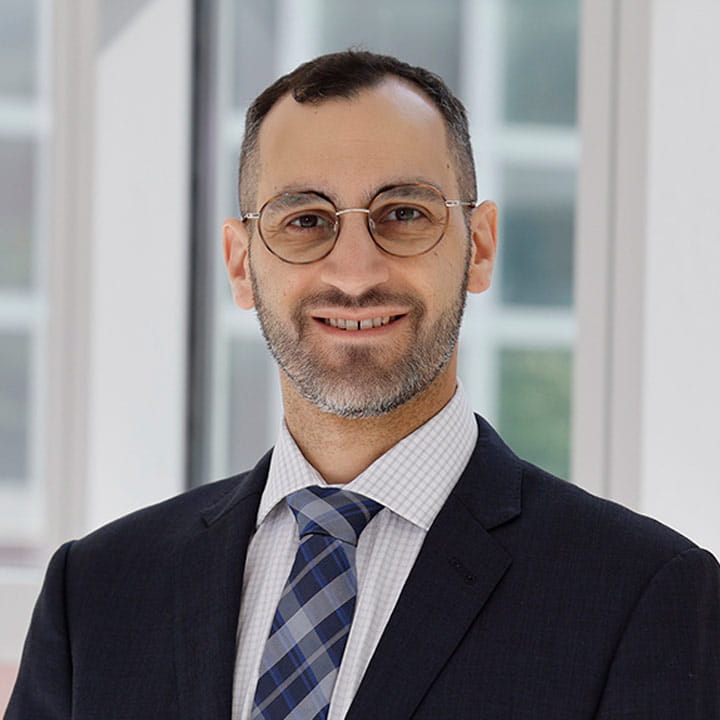 Dr. Walker is the Vice Chair for Research in the Department of Family and Community Medicine. His research focuses on a wide range of health services research topics, including efforts to use health information technology to improve communication, interorganizational coordination, and patient engagement. He is particularly interested in implementation science research that considers multi-stakeholder perspectives on health service innovations to improve patient and provider engagement. Dr. Walker employs mixed-methods approaches to this work, combining both quantitative and qualitative efforts.
Dr. Walker is the Vice Chair for Research in the Department of Family and Community Medicine. His research focuses on a wide range of health services research topics, including efforts to use health information technology to improve communication, interorganizational coordination, and patient engagement. He is particularly interested in implementation science research that considers multi-stakeholder perspectives on health service innovations to improve patient and provider engagement. Dr. Walker employs mixed-methods approaches to this work, combining both quantitative and qualitative efforts.
Dr. Walker’s current research explores these issues in relation to health system efforts to address social determinants of health such as food insecurity and digital equity, the exchange of health information across the care continuum, the implementation of patient-facing health information technology, and changes in delivery system configuration. Dr. Walker received his PhD in Global Health Management and Policy from Tulane University School of Public Health and Tropical Medicine and his Master of Public Health in Health Management and Policy from Drexel University Dornsife School of Public Health.
 Dr. Tarver is an assistant professor in the Department of Internal Medicine, Division of Cancer Prevention and Control, as well as a core faculty member with CATALYST. Dr. Tarver's research focuses on the use of health information technologies (e.g., patient portals, personal health records, and health information exchange) and understanding their potential to improve care coordination for people with cancer and who are part of underserved populations.
Dr. Tarver is an assistant professor in the Department of Internal Medicine, Division of Cancer Prevention and Control, as well as a core faculty member with CATALYST. Dr. Tarver's research focuses on the use of health information technologies (e.g., patient portals, personal health records, and health information exchange) and understanding their potential to improve care coordination for people with cancer and who are part of underserved populations.
Before coming to Ohio State, Dr. Tarver was a VA Medical Informatics Fellow in the Richard L. Roudebush VA Medical Center's Health Services Research and Development Center for Health Information and Communication in Indianapolis. He received his Doctor of Public Health in Health Care Organization and Policy from the University of Alabama at Birmingham.
Dr. Bunger is a professor with the Division of General Internal Medicine in The Ohio State University Department of Internal Medicine. Dr. Bunger is an implementation scientist and her research addresses the question: How can human service organizations and professionals work together to improve service access, quality, and outcomes for the communities they serve? Her work is set within the context of behavioral health and child welfare systems and is organized around three domains: (1) the role of interorganizational relationships for reducing service fragmentation, (2) knowledge sharing and best practice implementation, and (3) front-line practices that facilitate linkages to effective services. Her work is intended to inform policy and managerial strategies that close structural gaps and improve care quality. Currently, she is focusing on implementation of interventions that require collaboration across systems, and she is interested in developing practical tools to support executive leaders.
Dr. Bunger earned her bachelor's degree in psychology from Susquehanna University; her Masters of Social Work from Rutgers, The State University of New Jersey; and her PhD from the Brown School of Social Work at Washington University in St. Louis. She also completed post-doctoral training in behavioral health services and systems research at the Cecil G. Sheps Center for Health Services Research at the University of North Carolina at Chapel Hill.
 Dr. Cronin is an Associate Professor in the Department of Internal Medicine. He is a tenure-track clinician-researcher with a career goal of using health information technologies to improve the care of individuals with chronic diseases. Dr. Cronin is board certified in internal medicine, pediatrics, and clinical informatics, specializing in clinical informatics, sickle cell disease, phenotyping and personal health informatics. His knowledge in these areas includes technologies such as patient portals, mobile health technology, and electronic health records, and topics of health information needs, effective health communication, and patient engagement. He also has methodological expertise in qualitative and quantitative methods, community-engaged research, and clinical trials. He has interest and expertise in the design and evaluation of electronic surveys, empowering individuals with health care and health care information technology disparities, and transitional care of adolescents and young adults with chronic diseases from pediatric to adult medicine.
Dr. Cronin is an Associate Professor in the Department of Internal Medicine. He is a tenure-track clinician-researcher with a career goal of using health information technologies to improve the care of individuals with chronic diseases. Dr. Cronin is board certified in internal medicine, pediatrics, and clinical informatics, specializing in clinical informatics, sickle cell disease, phenotyping and personal health informatics. His knowledge in these areas includes technologies such as patient portals, mobile health technology, and electronic health records, and topics of health information needs, effective health communication, and patient engagement. He also has methodological expertise in qualitative and quantitative methods, community-engaged research, and clinical trials. He has interest and expertise in the design and evaluation of electronic surveys, empowering individuals with health care and health care information technology disparities, and transitional care of adolescents and young adults with chronic diseases from pediatric to adult medicine.
Dr. Cronin received an undergraduate degree in computer science from Cornell University and continued pursuing this passion after residency through a National Library of Medicine fellowship in biomedical informatics, from which he received a master’s degree. He completed his MD at The Ohio State University. His current research projects include his career development K23 grant and data coordinating center grant for the Cure Sickle Cell Initiative from the National Heart, Lung, and Blood Institute (NHLBI), and a part of the Data and Research Center for the All of Us Research Program.
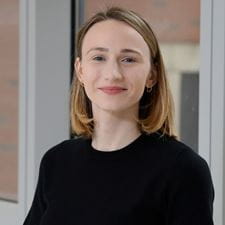 Dr. Crossnohere is an assistant professor with the Division of General Internal Medicine in The Ohio State University Department of Internal Medicine. She is a patient-centered outcomes researcher whose research areas include advancing methods for measuring patient and caregiver preferences, engaging patients to inform medical decision making, and integrating patient-reported outcomes into clinical care. She is experienced in the use of quantitative preference elicitation (e.g. discrete-choice experiments, best-worst scaling, health state utilities), survey methods, and systematic reviews.
Dr. Crossnohere is an assistant professor with the Division of General Internal Medicine in The Ohio State University Department of Internal Medicine. She is a patient-centered outcomes researcher whose research areas include advancing methods for measuring patient and caregiver preferences, engaging patients to inform medical decision making, and integrating patient-reported outcomes into clinical care. She is experienced in the use of quantitative preference elicitation (e.g. discrete-choice experiments, best-worst scaling, health state utilities), survey methods, and systematic reviews.
Dr. Crossnohere has received funding from groups including PCORI and PhRMA Foundation to advance work in measuring patient experiences. She is an editor of the journal The Patient: Patient-Centered Outcomes Research, and she is the 2022 winner of the Outstanding Paper by a Young Investigator Award at the Society for Medical Decision Making. Dr. Crossnohere earned her bachelor’s degree from Skidmore College and her MHS and PhD from the Johns Hopkins Bloomberg School of Public Health.
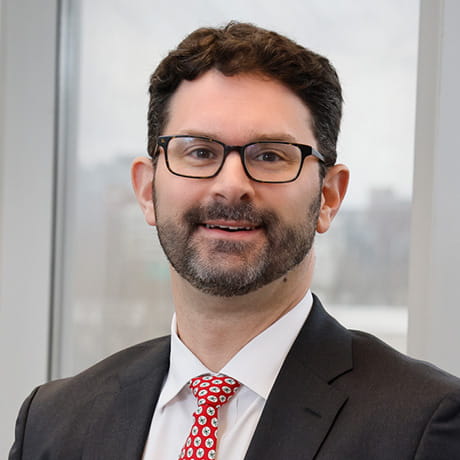 Dr. Jonas is a Professor of Clinical Medicine, a primary care physician, a health services researcher, and the Director for the Division of General Internal Medicine. Dr. Jonas’ primary research interests and areas of expertise include delivery of preventive services, chronic disease management, unhealthy alcohol use, implementation, and critical appraisal and synthesis of health literature. Dr. Jonas has led multiple clinical trials and numerous projects critically evaluating the scientific evidence on health care and health policy topics for groups making national recommendations, such as the Effective Healthcare Program of the Agency for Healthcare Research and Quality (AHRQ) and the U.S. Preventive Services Task Force (USPSTF).
Dr. Jonas is a Professor of Clinical Medicine, a primary care physician, a health services researcher, and the Director for the Division of General Internal Medicine. Dr. Jonas’ primary research interests and areas of expertise include delivery of preventive services, chronic disease management, unhealthy alcohol use, implementation, and critical appraisal and synthesis of health literature. Dr. Jonas has led multiple clinical trials and numerous projects critically evaluating the scientific evidence on health care and health policy topics for groups making national recommendations, such as the Effective Healthcare Program of the Agency for Healthcare Research and Quality (AHRQ) and the U.S. Preventive Services Task Force (USPSTF).
Prior to joining The Ohio State University in December 2020, Dr. Jonas was at the University of North Carolina at Chapel Hill for over 15 years where he worked as the Section Chief for Research in the Division of General Medicine and Clinical Epidemiology and as the Deputy Director for Research, Director of the Program on Medical Practice and Prevention, and Director of the Primary Care Research Fellowship at the Cecil G. Sheps Center for Health Services Research. He has served as co-Director of the RTI-UNC Evidence-based Practice Center since 2012. Dr. Jonas received his MD from Ohio State and his MPH from the University of North Carolina at Chapel Hill.
 Dr. Lee is an assistant professor in the Department of Internal Medicine. She is a clinician-researcher whose goal is to develop and implement innovative care models and technologies to improve population health care delivery. After completing her internal medicine residency, Dr. Lee pursued an additional three years of fellowship in health care research and innovation. Her advanced training in health services research introduced her to a broad array of skills, including foundations in biostatistics, causal inference methodologies, qualitative research, and cost effectiveness analysis.
Dr. Lee is an assistant professor in the Department of Internal Medicine. She is a clinician-researcher whose goal is to develop and implement innovative care models and technologies to improve population health care delivery. After completing her internal medicine residency, Dr. Lee pursued an additional three years of fellowship in health care research and innovation. Her advanced training in health services research introduced her to a broad array of skills, including foundations in biostatistics, causal inference methodologies, qualitative research, and cost effectiveness analysis.
She was mentored by experts in health care innovation and collaborated in a multidisciplinary team of bioinformaticians, software engineers, and clinicians to develop and operationalize an artificial intelligence tool for hypertension management. Dr. Lee has served as principal investigator and co-investigator on multiple internal and external grants. She is excited to continue building interdisciplinary and multi-institution collaborations to redesign the way we experience and deliver health care.
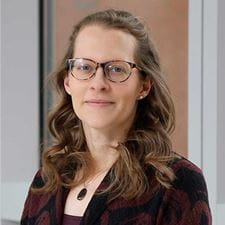 Dr. MacEwan is an assistant professor in the Division of General Internal Medicine. Her work as a health services researcher focuses on enhancing patient engagement through the use of health technologies and improving equitable use of patient-facing health technology tools. She is particularly interested in how health technologies can influence the management of chronic conditions through the communication and comprehension of patient-generated data and the impact of this data on shared decision making and health behaviors.
Dr. MacEwan is an assistant professor in the Division of General Internal Medicine. Her work as a health services researcher focuses on enhancing patient engagement through the use of health technologies and improving equitable use of patient-facing health technology tools. She is particularly interested in how health technologies can influence the management of chronic conditions through the communication and comprehension of patient-generated data and the impact of this data on shared decision making and health behaviors.
Dr. MacEwan received her PhD in biomedical engineering from Duke University and conducted postdoctoral research in molecular engineering at the University of Chicago. Her research as a biomedical engineer focused on the development of biomaterial systems for targeted cancer therapy and immunomodulation in autoimmunity. Before joining the Division of General Internal Medicine, Dr. MacEwan was a postdoctoral researcher with CATALYST.
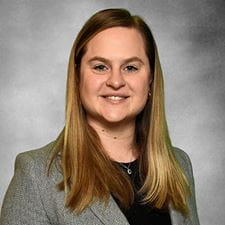 Amanda V. Gusovsky Chevalier, PhD, MPH is a mixed-methods pharmacoepidemiologist whose research focuses on improving medication prescribing practices across diverse areas of medicine. She combines secondary data sources (administrative claims, electronic health records, surveys, etc.) with rigorous epidemiologic methods to address complex questions in prescription medications and associated patient outcomes. Additionally, Dr. Chevalier leads qualitative studies that explore perspectives on prescription medications. Dr. Chevalier’s work spans multiple clinical domains, including neurologic disorders, chronic conditions, and maternal child health. Her interdisciplinary approach supports the development of evidence-based strategies to optimize medication use and improve patient care.
Amanda V. Gusovsky Chevalier, PhD, MPH is a mixed-methods pharmacoepidemiologist whose research focuses on improving medication prescribing practices across diverse areas of medicine. She combines secondary data sources (administrative claims, electronic health records, surveys, etc.) with rigorous epidemiologic methods to address complex questions in prescription medications and associated patient outcomes. Additionally, Dr. Chevalier leads qualitative studies that explore perspectives on prescription medications. Dr. Chevalier’s work spans multiple clinical domains, including neurologic disorders, chronic conditions, and maternal child health. Her interdisciplinary approach supports the development of evidence-based strategies to optimize medication use and improve patient care.
Dr. Chevalier is an Assistant Professor in the Ohio State University College of Medicine, Division of General Internal Medicine. She earned her PhD in Pharmaceutical Outcomes and Policy from the University of Kentucky College of Pharmacy and completed postdoctoral research in the Center for the Advancement of Team Science, Analytics, and Systems Thinking (CATALYST) at The Ohio State University College of Medicine. Dr. Chevalier is affiliated with CATALYST and the Neurology Health Services Research Division at Ohio State.
Dr. Presley is an Assistant Professor on the tenure track in the Division of Medical Oncology/Department of Internal Medicine at The Ohio State University Comprehensive Cancer Center – Arthur G. James Cancer Hospital and Richard J. Solove Research Institute. She earned her undergraduate degree from the University of Minnesota, Twin Cities and her medical degree from Dartmouth Medical School. She completed residency in Internal Medicine and combined fellowship in Geriatric Oncology and Hematology at Yale University. She completed a master’s in Health Sciences, also at Yale, within the Robert Wood Johnson Foundation Clinical Scholars Program sponsored by the VA Connecticut Healthcare System.
Dr. Presley is an active member of the Ohio State University Comprehensive Cancer Program, The American Geriatrics Society, and the American Society of Clinical Oncology. She has been a longtime member of the international Cancer and Aging Research Group (CARG). Dr. Presley leads studies focused on maintaining functional independence among older adults with lung cancer. These studies incorporate geriatric assessment, embedded palliative care, and interventions to improve risk factors for treatment toxicity and functional decline. She has been funded by the National Institute on Aging, the BMS Foundation, and the Rising Tide Foundation. She is one of the first two women to receive the preeminent Paul Beeson Emerging Leaders in Aging Career Development Award at Ohio State, and she also received the National LEAD Rising Star Award for Women in hematology and oncology.
 Dr. Ce Shang is an Assistant Professor in Medical Oncology at the Department of Internal Medicine at The Ohio State University Wexner Medical Center. Dr. Shang is a health economist with extensive experience in regulatory science. Her research focuses on the economic analysis of health behaviors, with an emphasis on how taxes and policies impact substance use and abuse. Dr. Shang’s research has been funded by the U.S. National Cancer Institute (NCI), National Institute on Drug Abuse (NIDA), Canadian Institutes of Health Research (CIHR), and various foundation awards. Her projects involve using experiments and observational data to estimate consumers' preferences and demand for tobacco, cannabis, and alcohol products.
Dr. Ce Shang is an Assistant Professor in Medical Oncology at the Department of Internal Medicine at The Ohio State University Wexner Medical Center. Dr. Shang is a health economist with extensive experience in regulatory science. Her research focuses on the economic analysis of health behaviors, with an emphasis on how taxes and policies impact substance use and abuse. Dr. Shang’s research has been funded by the U.S. National Cancer Institute (NCI), National Institute on Drug Abuse (NIDA), Canadian Institutes of Health Research (CIHR), and various foundation awards. Her projects involve using experiments and observational data to estimate consumers' preferences and demand for tobacco, cannabis, and alcohol products.
Dr. Shang received the 2015 Centers for Disease Control and Prevention Kaafee Billah Memorial Award in Economics Research and was among the 2016 cohort of World Heart Federation (WHF) Emerging Leaders of tobacco control. Dr. Shang’s work has appeared in such peer-reviewed publications as the American Journal of Medicine, Tobacco Control, Nicotine and Tobacco Research, Preventive Medicine and Addiction. She is also one of the co-founders of Tobacco Online Policy Seminar (TOPS), a free multidisciplinary international forum for tobacco policy research.
 Dr. Agne is a palliative medicine specialist, an assistant professor in the Department of Internal Medicine, and a member of the American Academy of Hospice and Palliative Medicine. Her clinical focus is outpatient cancer symptom management and counseling for patients and families during difficult decisions involving their medical care. Dr. Agne's goal is to support patients during all phases of their life after cancer diagnosis.
Dr. Agne is a palliative medicine specialist, an assistant professor in the Department of Internal Medicine, and a member of the American Academy of Hospice and Palliative Medicine. Her clinical focus is outpatient cancer symptom management and counseling for patients and families during difficult decisions involving their medical care. Dr. Agne's goal is to support patients during all phases of their life after cancer diagnosis.
Dr. Agne serves as a manuscript reviewer for the Journal of Palliative Medicine, Cancer, and Journal of Oncology Practice. She has presented at national and international conferences sponsored by the American Academy of Hospice and Palliative Medicine and the International Association for the Study of Lung Cancer. She is also an institutional representative for National Comprehensive Cancer Network Adult Cancer Pain Panel. Dr. Agne received her doctorate from the University of Cincinnati College of Medicine, and she completed her residency and fellowship at The Ohio State University Wexner Medical Center.
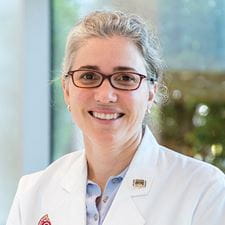 Dr. Gustin is the director of the Division of Palliative Medicine in the Department of Internal Medicine and a clinical associate professor. She focuses on supporting patients and their families who are facing serious illnesses. She is an expert in symptom management and communication related to advance care planning and goals of care, and she works in close collaboration with patients’ primary teams to ensure that the care patients receive is aligned with their values and goals.
Dr. Gustin is the director of the Division of Palliative Medicine in the Department of Internal Medicine and a clinical associate professor. She focuses on supporting patients and their families who are facing serious illnesses. She is an expert in symptom management and communication related to advance care planning and goals of care, and she works in close collaboration with patients’ primary teams to ensure that the care patients receive is aligned with their values and goals.
In addition to her clinical work, Dr. Gustin is a Fellow of the American Academy of Hospice and Palliative Medicine (AAHPM); a member of the AAHPM Leadership and Career Development committee; past co-chair of the AAHPM/ACGME Milestone Workgroup; and a Distinguished Faculty for Vitaltalk, a national nonprofit organization designed to improve communication training for physicians and other providers. She has also co-authored multiple publications in the Journal of Palliative Medicine and the Journal of Pain and Symptom Management, the two top journals for her subspecialty. Dr. Gustin completed her medical training at The Ohio State University College of Medicine. She completed her residency at The Ohio State University Wexner Medical Center and her fellowship at the Dana-Farber Cancer Institute in Boston.
Dr. Kale is an associate professor in the Department of Internal Medicine's Division of Palliative Medicine. His clinical focus is in ambulatory palliative medicine, and he is the Medical Director of Ambulatory Palliative Care at The Ohio State University Comprehensive Cancer Center – Arthur G. James Cancer Hospital and Richard J. Solove Research Institute. He has developed expertise in the use of opioids to manage cancer pain; has co-authored several internal, peer-reviewed clinical practice guidelines related to opioid prescribing and substance abuse; and has presented on the topic nationally.
Additionally, in September 2020, Dr. Kale founded the Palliative Harm Reduction & Resiliency Clinic at The Ohio State University. The clinic, which is funded in part by a Care Innovation and Community Improvement Program, is dedicated to the management of cancer-related pain in patients with co-morbid substance use disorder and is among the first of its kind in the nation. Dr. Kale also serves as a member of the hospital-wide committee addressing the opioid abuse epidemic and the Opioid and Analgesics Pharmacy and Therapeutics subcommittee. He is a reviewer for the Journal of Palliative Medicine, Cancer, and the Journal of Cancer Survivorship. Dr. Kale received his medical degree from the University of Pittsburgh, and he completed his residency at The Ohio State University Wexner Medical Center and his subsequent fellowship in Hospice and Palliative Medicine at the Icahn School of Medicine at Mount Sinai.
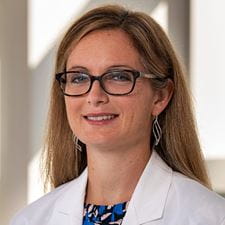 Dr. Stevens is an Associate Clinical Professor in the Department of Internal Medicine's Division of Palliative Medicine. As a geriatrician and palliative care specialist, Dr. Stevens focuses on helping older patients adjust to aging-related needs and cancer symptoms. Her clinical work, quality improvement projects, and teaching are directed toward improving the delivery of care to patients who require a delicate balance of medical intervention and goal-aligned care.
Dr. Stevens is an Associate Clinical Professor in the Department of Internal Medicine's Division of Palliative Medicine. As a geriatrician and palliative care specialist, Dr. Stevens focuses on helping older patients adjust to aging-related needs and cancer symptoms. Her clinical work, quality improvement projects, and teaching are directed toward improving the delivery of care to patients who require a delicate balance of medical intervention and goal-aligned care.
Dr. Stevens is a member of the Cancer Control Program at The Ohio State University Comprehensive Cancer Center – Arthur G. James Cancer Hospital and Richard J. Solove Research Institute. There, she developed a geriatric palliative care oncology clinic called the CARE-Pall Clinic, which allows her to contribute to ongoing research in the field and help others best understand how to treat and meet the geriatric and palliative care of older adults undergoing active cancer treatment. She is interested in establishing qualify of life metrics; better understanding the decreased enrollment in clinical trials; and considering the role that cognitive impairment has on decision-making, adherence, and overall outcomes. One of her current projects, which is funded by an internal pilot grant sponsored by the Department of Internal Medicine, studies the relationship and outcomes of older adult allogeneic hematopoietic cell transplant recipients who have had a geriatric assessment with management. Her work has appeared in several peer-reviewed publications, including the Journal of Palliative Medicine and the Journal of Clinical Oncology and Trials.
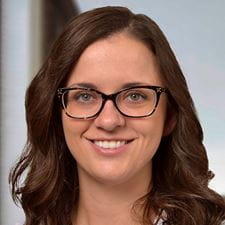 Dr. Waterman is an Associate Clinical Professor in the Department of Internal Medicine's Division of Palliative Medicine. She specializes in symptom management and end-of-life care, and she believes in providing exceptional care to patients who are faced with serious, life-limiting illnesses. She thinks it is important for patients and their families to have an active role in their care, and she enjoys helping her patients explore their values, preferences, and goals for their care. She strives to provide effective symptom management for patients throughout the course of their illness, as well as at the end of life.
Dr. Waterman is an Associate Clinical Professor in the Department of Internal Medicine's Division of Palliative Medicine. She specializes in symptom management and end-of-life care, and she believes in providing exceptional care to patients who are faced with serious, life-limiting illnesses. She thinks it is important for patients and their families to have an active role in their care, and she enjoys helping her patients explore their values, preferences, and goals for their care. She strives to provide effective symptom management for patients throughout the course of their illness, as well as at the end of life.
Dr. Waterman's research interests include integrating palliative medicine into the care of patients with end-stage liver disease and other life-limiting illnesses. She received her doctorate from The Ohio State University College of Medicine, and she completed her residency at Vanderbilt University Medical Center in Nashville, Tenn., before returning to Ohio State for her fellowship. When she is not working, Dr. Waterman enjoys jogging, painting, hiking, and exploring Columbus.
 Dr. Brummel is an associate professor in the Division of Pulmonary, Critical Care and Sleep Medicine in The Ohio State University College of Medicine. His research program seeks to better understand and mitigate the processes that result in disabilities in basic self-care activities and mobility among the growing number of people who survive serious and life-threatening critical illness, with a focus on older adults. Through the conduct of observational studies and randomized clinical trials, he has described – and studied interventions to improve – the dramatic life alterations suffered by patients who develop long-lasting disability and frailty after critical illness that are hypothesized to be related to underlying and newly acquired vulnerabilities.
Dr. Brummel is an associate professor in the Division of Pulmonary, Critical Care and Sleep Medicine in The Ohio State University College of Medicine. His research program seeks to better understand and mitigate the processes that result in disabilities in basic self-care activities and mobility among the growing number of people who survive serious and life-threatening critical illness, with a focus on older adults. Through the conduct of observational studies and randomized clinical trials, he has described – and studied interventions to improve – the dramatic life alterations suffered by patients who develop long-lasting disability and frailty after critical illness that are hypothesized to be related to underlying and newly acquired vulnerabilities.
Dr. Brummel received a bachelor's degree in biology and a master's degree in biomedical sciences from Creighton University, completed a Master of Science in Clinical Investigation from the Vanderbilt University School of Medicine, and earned his MD from the University of Missouri School of Medicine. He completed his internship and residency in internal medicine at Ohio State's Wexner Medical Center, where he also served as chief resident. He completed fellowship training in pulmonary disease and critical care medicine at Vanderbilt University Medical Center, where he also completed his post-doctoral research training. Following his training, he served on the faculty in the Division of Allergy, Pulmonary and Critical Care and Department of Medicine at Vanderbilt, where he was an investigator with the Critical Illness Survivorship and Brain Dysfunction Center led by Dr. Wes Ely and Dr. Pratik Pandharipande. He is the prior recipient of a Paul B. Beeson Emerging Leaders Career Development award, the nation's preeminent aging-research focused career development award from the National Institutes of Health. He the founder and chair of two aging-focused, collaborative, critical care groups worldwide through the American Thoracic Society Aging in Critical Care Interest Group and the Society of Critical Care Medicine Geriatrics Knowledge Education Group.
 Dr. Odackal is a clinical assistant professor in the Department of Internal Medicine’s Division of Pulmonary, Critical Care and Sleep Medicine at The Ohio State University. In addition to treating patients with interstitial lung disease and critical illness, Dr. Odackal is focused on advancing health equity in the care of chronic lung disease through research. His current work examines access to care for patients with interstitial lung disease and sarcoidosis and he has published multiple peer-reviewed journal articles pertaining to pulmonary fibrosis and other chronic pulmonary conditions.
Dr. Odackal is a clinical assistant professor in the Department of Internal Medicine’s Division of Pulmonary, Critical Care and Sleep Medicine at The Ohio State University. In addition to treating patients with interstitial lung disease and critical illness, Dr. Odackal is focused on advancing health equity in the care of chronic lung disease through research. His current work examines access to care for patients with interstitial lung disease and sarcoidosis and he has published multiple peer-reviewed journal articles pertaining to pulmonary fibrosis and other chronic pulmonary conditions.
Prior to joining faculty at Ohio State, Dr. Odackal received a master’s degree in teaching science from New York University as well as a master’s degree in clinical research from the University of Virginia. He earned his MD from the SUNY Downstate Health Sciences University College of Medicine in Brooklyn, N.Y., and completed a pulmonary and critical care fellowship at the University of Colorado.
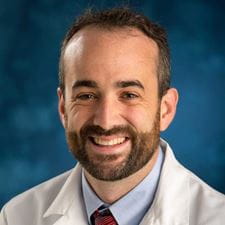 Dr. Burke trained in Neurology and Vascular Neurology at the University of Michigan, completed health services research training through the Robert Wood Johnson Clinical Scholars Program, and served on the faculty of UM before joining Ohio State to co-direct the HSR Neurology Division. Dr. Burke has been continuously funded by the National Institutes of Health, and his research has focused on a variety of topics including individualized treatment decisions, understanding racial disparities in stroke outcomes, and exploring how patient preferences affect health outcomes. Dr. Burke applies advanced statistical methodology to optimize diagnostic and treatment decisions for individual patients.
Dr. Burke trained in Neurology and Vascular Neurology at the University of Michigan, completed health services research training through the Robert Wood Johnson Clinical Scholars Program, and served on the faculty of UM before joining Ohio State to co-direct the HSR Neurology Division. Dr. Burke has been continuously funded by the National Institutes of Health, and his research has focused on a variety of topics including individualized treatment decisions, understanding racial disparities in stroke outcomes, and exploring how patient preferences affect health outcomes. Dr. Burke applies advanced statistical methodology to optimize diagnostic and treatment decisions for individual patients.
Dr. Burke's research has addressed a variety of topics, such as how to best target treatment to individual patients, evaluating the value of neurologic care, understanding how end-of-life preferences influence care, understanding how race disparities emerge after stroke, and evaluating population-level outcomes of varying treatment strategies.
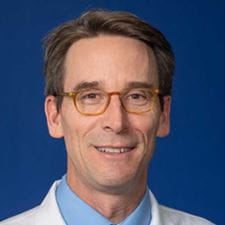 Dr. Kerber trained in neurology at the University of Michigan and neurotology at the University of California, Los Angeles. He completed a master’s degree in Health and Healthcare Research at UM. He was on the faculty of UM before joining Ohio State to co-found the HSR Neurology. His grant funding, from the National Institutes of Health and Agency for Healthcare Research and Quality, has included projects about the clinical epidemiology of dizziness, clinical decision rule development to identify stroke in acute dizziness presentations, health services randomized clinical trials to implement evidence-based care practices in routine care emergency departments, and the development and evaluation of patient-oriented behavioral interventions. He is particularly interested in the development and management of patient-focused resources.
Dr. Kerber trained in neurology at the University of Michigan and neurotology at the University of California, Los Angeles. He completed a master’s degree in Health and Healthcare Research at UM. He was on the faculty of UM before joining Ohio State to co-found the HSR Neurology. His grant funding, from the National Institutes of Health and Agency for Healthcare Research and Quality, has included projects about the clinical epidemiology of dizziness, clinical decision rule development to identify stroke in acute dizziness presentations, health services randomized clinical trials to implement evidence-based care practices in routine care emergency departments, and the development and evaluation of patient-oriented behavioral interventions. He is particularly interested in the development and management of patient-focused resources.
Dr. Kerber currently is collaborating with Kaiser Permanente Southern California on an NIH-funded clinical trial of a provider- and patient-based implementation strategy to optimize management and outcomes for ED dizziness presentations. He has also evaluated payment policies and collaborated with other investigators across a variety of topics including stroke epidemiology, geographic variation in neurologists and neurologic care, and the value of neurologic care. Dr. Kerber serves as a Vice-Chair of Clinical Operations and the Director of the Neuro-otology program.
 Dr. Costantine is the Frederick P. Zuspan MD Professor of Obstetrics and Gynecology in The Ohio State University College of Medicine and the director of the Division of Maternal Fetal Medicine at The Ohio State University Wexner Medical Center. He received his MD from American University of Beirut, Lebanon, and completed his residency at the University of Cincinnati and a fellowship in maternal fetal medicine at the University of Texas Medical Branch in Galveston, Texas.
Dr. Costantine is the Frederick P. Zuspan MD Professor of Obstetrics and Gynecology in The Ohio State University College of Medicine and the director of the Division of Maternal Fetal Medicine at The Ohio State University Wexner Medical Center. He received his MD from American University of Beirut, Lebanon, and completed his residency at the University of Cincinnati and a fellowship in maternal fetal medicine at the University of Texas Medical Branch in Galveston, Texas.
Dr. Costantine is an active clinical investigator, having published more than 200 scholarly articles and book chapters. His primary research interests are hypertensive disorders of pregnancy, perinatal pharmacology, preterm birth, and repurposing medications for the prevention of pregnancy morbidities. He is the principal investigator for Ohio State’s participation in the Eunice Kennedy Shriver National Institute of Child Health and Human Development (NICHD) Maternal Fetal Medicine Units Network as well as for a comparative effectiveness study of different doses of aspirin for prevention of hypertensive disorders of pregnancy that is funded by the Patient-Centered Outcomes Research Institute (PCORI) and for the NICHD-funded MPRINT Translational Resource Platform for monitoring therapeutics in pregnancy. Additionally, he serves on several National Institutes of Health Scientific Review Groups. At Ohio State, Dr. Costantine oversees the clinical, research, and administrative operations of the division of Maternal Fetal Medicine.
 Dr. Dixon is a clinical associate professor in the Department of Obstetrics and Gynecology in The Ohio State University College of Medicine. She is also the medical director of Moms2B, a community-based pregnancy program for women from historically disadvantaged communities that was established by Ohio State in 2010; a clinical advisor for the Ohio Perinatal Quality Collaborative; and a member of the Ohio Pregnancy-Associated Mortality Review Committee.
Dr. Dixon is a clinical associate professor in the Department of Obstetrics and Gynecology in The Ohio State University College of Medicine. She is also the medical director of Moms2B, a community-based pregnancy program for women from historically disadvantaged communities that was established by Ohio State in 2010; a clinical advisor for the Ohio Perinatal Quality Collaborative; and a member of the Ohio Pregnancy-Associated Mortality Review Committee.
Dr. Dixon’s research interests are focused on removing inequalities that exist in OB/GYN care through initiatives such as increasing access to quality health care for historically underserved communities and implementing training for faculty, staff, and medical students. She is also interested in how social determinants of health affect pregnancy outcomes and what strategies can be employed to improve those outcomes. Dr. Dixon received her MD from the Georgetown University School of Medicine in Washington, D.C., and completed her residency at the Baylor College of Medicine in Houston.
 Dr. Venkatesh is an obstetrician and gynecologist, a maternal fetal medicine specialist, and PhD perinatal epidemiologist. He is jointly appointed in the Department of Obstetrics and Gynecology in the College of Medicine and the Division of Epidemiology of the College of Public Health; he is also active in The Ohio State University's Institute for Population Research. His clinical practice focuses on diabetes in pregnancy, and he is the director of the OSUWMC Diabetes in Pregnancy Program, which is one of the oldest and largest integrated prenatal and diabetes care programs in the country serving more than 800 pregnant people with type 1, type 2, and gestational diabetes every year across central and southern Ohio.
Dr. Venkatesh is an obstetrician and gynecologist, a maternal fetal medicine specialist, and PhD perinatal epidemiologist. He is jointly appointed in the Department of Obstetrics and Gynecology in the College of Medicine and the Division of Epidemiology of the College of Public Health; he is also active in The Ohio State University's Institute for Population Research. His clinical practice focuses on diabetes in pregnancy, and he is the director of the OSUWMC Diabetes in Pregnancy Program, which is one of the oldest and largest integrated prenatal and diabetes care programs in the country serving more than 800 pregnant people with type 1, type 2, and gestational diabetes every year across central and southern Ohio.
As a physician-scientist, Dr. Venkatesh's mission is to improve maternal and child outcomes in high-risk pregnancies using innovative approaches that integrate clinical trials, perinatal epidemiology, and precision medicine. His research focuses on diabetes in pregnancy and perinatal infectious diseases. Dr. Venkatesh has methodological expertise in clinical trials, longitudinal cohort studies, and clinical prediction models using both statistical methods and machine learning. He has authored more than 130 peer-reviewed scientific manuscripts. Currently, Dr. Venkatesh is the PI/MPI of three large studies funded by the NIH (UG3), AHRQ (R01), and PCORI (Large grant): 1) NIH's ECHO Ohio prospective longitudinal cohort examining the impact of maternal cardiometabolic health in pregnancy on long-term child neurodevelopment; 2) AHRQ's ACHIEVE RCT studying the impact of continuous glucose monitoring, mobile applications, and addressing social needs on glycemic control for Medicaid-insured pregnant individuals with poorly controlled type 2 diabetes; 3) PCORI's DECIDE, a comparative effectiveness, patient-centered RCT, defining whether metformin is non-inferior to insulin for prevention of adverse pregnancy outcomes and safe through two years of postpartum follow-up among more than 1,500 individuals with gestational diabetes and their exposed infants at 20 U.S. centers. Dr. Venkatesh earned his MD from Warren Alpert Medical School at Brown University; he also completed his PhD at Brown University.
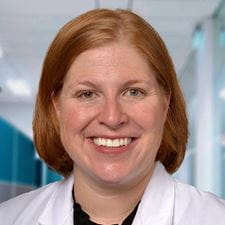 Dr. Quatman is an Associate Professor of Clinical Orthopaedics in the Division of Trauma. As an orthopedic surgeon, she specializes in orthopedic trauma care with a special emphasis on geriatric care. Dr. Quatman is passionate about integrating cutting-edge technology into clinical care to significantly improve patient outcomes. She is one of two surgeons in the country to complete a geriatric orthopedic training fellowship, helped create criteria for fellowship certification in geriatric orthopedic trauma care through the International Geriatric Fracture Society, was selected to participate in the National Institute of Health’s National Institute of Aging Bulter-Williams Scholar Program, and was a member of a research team that received the Orthopaedic Research and Education Foundation Clinical Research Award for 15 years of collaborative research on knee injury prevention strategies.
Dr. Quatman is an Associate Professor of Clinical Orthopaedics in the Division of Trauma. As an orthopedic surgeon, she specializes in orthopedic trauma care with a special emphasis on geriatric care. Dr. Quatman is passionate about integrating cutting-edge technology into clinical care to significantly improve patient outcomes. She is one of two surgeons in the country to complete a geriatric orthopedic training fellowship, helped create criteria for fellowship certification in geriatric orthopedic trauma care through the International Geriatric Fracture Society, was selected to participate in the National Institute of Health’s National Institute of Aging Bulter-Williams Scholar Program, and was a member of a research team that received the Orthopaedic Research and Education Foundation Clinical Research Award for 15 years of collaborative research on knee injury prevention strategies.
Dr. Quatman received her MD and PhD from the University of Toledo, and she trained at The Ohio State University for her residency.
 Dr. Miller is a head and neck surgical oncologist in the Department of Otolaryngology – Head and Neck Surgery in The Ohio State University College of Medicine. As a health services researcher, she has focused her work on the optimization of cancer care delivery for patients undergoing treatment for head and neck cancer.
Dr. Miller is a head and neck surgical oncologist in the Department of Otolaryngology – Head and Neck Surgery in The Ohio State University College of Medicine. As a health services researcher, she has focused her work on the optimization of cancer care delivery for patients undergoing treatment for head and neck cancer.
Dr. Miller earned her MD from the Perelman School of Medicine at the University of Pennsylvania and MBA from the Wharton School. She then completed her residency with the Harvard Medical School/Mass Eye and Ear Residency Program in Otolaryngology – Head and Neck Surgery, followed by a fellowship in Head and Neck Oncologic Surgery at The Ohio State University.
 Dr. Rathi is a rhinologist and health policy researcher in the Department of Otolaryngology – Head and Neck Surgery at The Ohio State University College of Medicine. His research is focused on promoting safe and effective use of medical devices and the affordability of health care. His work has been published in the New England Journal of Medicine, JAMA, and Nature Biotechnology, and his contributions have been featured by the New York Times, the Washington Post, CBS News, and Forbes.
Dr. Rathi is a rhinologist and health policy researcher in the Department of Otolaryngology – Head and Neck Surgery at The Ohio State University College of Medicine. His research is focused on promoting safe and effective use of medical devices and the affordability of health care. His work has been published in the New England Journal of Medicine, JAMA, and Nature Biotechnology, and his contributions have been featured by the New York Times, the Washington Post, CBS News, and Forbes.
Dr. Rathi earned his MBA from Harvard Business School, received his MD at Yale University School of Medicine in New Haven, Conn., completed his residency with the Harvard Medical School/Mass Eye and Ear/Mass General Brigham Residency Program, and completed his fellowship in rhinology and anterior skull base surgery at the Medical University of South Carolina in Charleston.
 Dr. Lujan is a clinical associate professor of pathology with a dual board certification in anatomic and clinical pathology from the American Board of Pathology and a certification by the American Board of Artificial Intelligence in Medicine. At The Ohio State University, he has dual clinical and administrative roles as a surgical pathologist subspecializing in gastrointestinal pathology, and he serves as the director of the Division of Digital and Computational Pathology and the OSU Digital Scan Center.
Dr. Lujan is a clinical associate professor of pathology with a dual board certification in anatomic and clinical pathology from the American Board of Pathology and a certification by the American Board of Artificial Intelligence in Medicine. At The Ohio State University, he has dual clinical and administrative roles as a surgical pathologist subspecializing in gastrointestinal pathology, and he serves as the director of the Division of Digital and Computational Pathology and the OSU Digital Scan Center.
Dr. Lujan’s professional interests include advancing pathology into the era of precision medicine by testing and deploying AI tools into daily clinical workflow. He has several peer reviewed articles and has delivered national and international presentations on these topics. Dr. Lujan earned his MD from the University of El Salvador School of Medicine in San Salvador, and he completed a pathology residency program at the University of Texas Southwestern Medical Center and a surgical pathology fellowship at the Johns Hopkins University School of Medicine in Baltimore.
 Dr. Bridge is a professor with the Department of Pediatrics in The Ohio State University College of Medicine; he is also the director of the Center for Suicide Prevention and Research in the Abigail Wexner Research Institute at Nationwide Children’s Hospital. In addition, he is the Nationwide Foundation Endowed Chair of Innovation in Behavioral Health Research.
Dr. Bridge is a professor with the Department of Pediatrics in The Ohio State University College of Medicine; he is also the director of the Center for Suicide Prevention and Research in the Abigail Wexner Research Institute at Nationwide Children’s Hospital. In addition, he is the Nationwide Foundation Endowed Chair of Innovation in Behavioral Health Research.
Dr. Bridge is an epidemiologist whose clinical and research interests include the epidemiology of suicidal behavior in young people, neurocognitive vulnerability to suicidal behavior, and quality of care for youth at risk for suicide. In particular, he is interested in research regarding vulnerability factors of adolescent suicidal behavior and improving the identification, emergency management, and follow-up care of youth at risk for suicide. Dr. Bridge received his PhD in epidemiology from the University of Pittsburgh.
Dr. Lee is a clinical assistant fellow of pediatrics at The Ohio State University Wexner Medical Center. She practices pediatric gastroenterology and clinical informatics at Nationwide Children’s Hospital. She wants to leverage technology to improve bedside clinical care and understand how the implementation of technology affects physician and patient experience through the health care system. Dr. Lee's recent studies focus on understanding physician practices regarding use of the electronic health record and studying the effects of operational changes to the EHR as well as point of care clinical decision support. She received her medical degree from the West Virginia University School of Medicine in Morgantown and completed her residency in pediatrics and fellowship in pediatric gastroenterology at the University of Tennessee Health Science center at Le Bonheur Children's Hospital/St. Judes Children's Hospital in Memphis. She completed a clinical informatics fellowship at the Ohio State Wexner Medical Center.
 Dr. Yarar-Fisher is an Associate Professor and Vice Chair of Research at The Ohio State University Department of Physical Medicine and Rehabilitation and Director of Clinical Research at the Belford Center for Spinal Cord Injury. Her translational research program focuses on understanding the pathophysiology of traumatic spinal cord injury in the acute and chronic stages with the purpose of developing novel dietary and rehabilitation strategies to improve neuro-recovery, metabolism, and bowel function. Her laboratory develops and tests therapeutic diets and electrical stimulation programs to evaluate new ways to prevent neuronal death; promote recovery and function in the acute stages; and improve body composition, gut microbiome composition, and skeletal muscle and metabolic health in the chronic stages of SCI.
Dr. Yarar-Fisher is an Associate Professor and Vice Chair of Research at The Ohio State University Department of Physical Medicine and Rehabilitation and Director of Clinical Research at the Belford Center for Spinal Cord Injury. Her translational research program focuses on understanding the pathophysiology of traumatic spinal cord injury in the acute and chronic stages with the purpose of developing novel dietary and rehabilitation strategies to improve neuro-recovery, metabolism, and bowel function. Her laboratory develops and tests therapeutic diets and electrical stimulation programs to evaluate new ways to prevent neuronal death; promote recovery and function in the acute stages; and improve body composition, gut microbiome composition, and skeletal muscle and metabolic health in the chronic stages of SCI.
Dr. Yarar-Fisher has received funding from the National Institutes of Health and National Institute on Disability, Independent Living, and Rehabilitation Research to support her investigations in SCI. She was selected as one of the 10 Outstanding Young Persons of Turkey by Junior Chamber International for her work in Academic leadership and accomplishment. She served two years as Treasurer, Chair-Elect, and Chair in American Congress of Rehabilitation Medicine (ACRM) SCI-Special Interest Group, and she is a member of ACRM, the Academy of Spinal Cord Injury Professionals, the American College of Sports Medicine, and the American Physiological Society.
 Dr. Hyzak is the Provost's Tenure Track Fellow-to-Assistant Professor faculty member in the Department of Physical Medicine and Rehabilitation at The Ohio State University College of Medicine. She is a trained implementation scientist with a specialization in traumatic brain injury (TBI) research-to-practice translation. Using mixed methodologies, Dr. Hyzak's research focuses on applying implementation science to improve the adoption, reach, fidelity, scalability, and sustainment of evidence-based practices (EBPs) for individuals with TBI and psychiatric comorbidities, as well as investigating multi-level determinants, implementation strategies, and mechanisms affecting EBP uptake with the ultimate goal of getting interventions into clinical practice more quickly. She enjoys team science approaches to answering system-level questions to improve care for individuals with TBI.
Dr. Hyzak is the Provost's Tenure Track Fellow-to-Assistant Professor faculty member in the Department of Physical Medicine and Rehabilitation at The Ohio State University College of Medicine. She is a trained implementation scientist with a specialization in traumatic brain injury (TBI) research-to-practice translation. Using mixed methodologies, Dr. Hyzak's research focuses on applying implementation science to improve the adoption, reach, fidelity, scalability, and sustainment of evidence-based practices (EBPs) for individuals with TBI and psychiatric comorbidities, as well as investigating multi-level determinants, implementation strategies, and mechanisms affecting EBP uptake with the ultimate goal of getting interventions into clinical practice more quickly. She enjoys team science approaches to answering system-level questions to improve care for individuals with TBI.
Dr. Hyzak's research has been funded through the National Institute of Neurological Disorders and Stroke of the National Institutes of Health. She was the recipient of the 2023 Merriss Cornell Distinguished Researcher Award for her dissertation examining implementation of TBI screening in behavioral health treatment settings. Dr. Hyzak is a member of the Chronic Brain Injury Task Force of the American Congress of Rehabilitation Medicine Brain Injury Special Interest Group, as well as the International Brain Injury Association, the North American Brain Injury Society, and the Society for Implementation Research Collaboration. Locally, she serves as an elected member of the Ohio Brain Injury Advisory Committee.
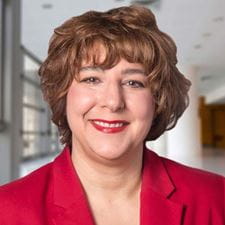 Dr. Fontanella is an Associate Professor in the Department of Psychiatry and Behavioral Health at The Ohio State University and Principal Investigator at the Nationwide Children’s Hospital Center for Suicide Prevention and Research. Dr. Fontanella is a mental health services researcher and a national expert in youth suicide in “boundaried” settings (e.g., health care settings, Medicaid). Her research focuses on characterizing demographic and clinical profiles of suicidal youth within such settings, understanding patterns and trends in utilization and quality of health and mental health care for suicidal youth, examining how this affects outcomes, and exploring strategies for suicide prevention in various health care settings.
Dr. Fontanella is an Associate Professor in the Department of Psychiatry and Behavioral Health at The Ohio State University and Principal Investigator at the Nationwide Children’s Hospital Center for Suicide Prevention and Research. Dr. Fontanella is a mental health services researcher and a national expert in youth suicide in “boundaried” settings (e.g., health care settings, Medicaid). Her research focuses on characterizing demographic and clinical profiles of suicidal youth within such settings, understanding patterns and trends in utilization and quality of health and mental health care for suicidal youth, examining how this affects outcomes, and exploring strategies for suicide prevention in various health care settings.
Dr. Fontanella has extensive experience reviewing large administrative claims databases, hospital discharge datasets, and other research databases to answer important national policy questions related to service use and quality of mental health care. Fontanella has published in leading academic journals such as Jama Pediatrics, JAMA Network Open, and American Journal of Preventive Medicine. She is the MPI on a NIMH center on youth suicide prevention and has a strong record of NIH funding. Dr. Fontanella holds a Bachelor of Arts in psychology from Villanova University, a master’s degree from Bryn Mawr College Graduate School of Social Work and Social Research, and a Doctor of Philosophy in social work from University of Maryland at Baltimore. She also completed a NIMH funded postdoctoral fellowship in mental health services research at the Rutgers Institute for Health, Health Care Policy and Aging Research.
 Dr. Myers is a clinical assistant professor of surgery with the Division of Surgical Oncology in The Ohio State University College of Medicine. She works to advance breast surgical oncology through health services research. Her work focuses primarily on optimizing care of young adults with breast cancer through improving age-specific care pathways and reducing the impact of financial toxicity.
Dr. Myers is a clinical assistant professor of surgery with the Division of Surgical Oncology in The Ohio State University College of Medicine. She works to advance breast surgical oncology through health services research. Her work focuses primarily on optimizing care of young adults with breast cancer through improving age-specific care pathways and reducing the impact of financial toxicity.
Dr. Myers earned her MD from the University of North Carolina at Chapel Hill School of Medicine. She completed her residency in general surgery and the University of Pittsburgh Medical Center, during which she simultaneously received her PhD in Clinical and Translational Science. After residency, she completed her fellowship in breast surgical oncology at Memorial Sloan-Kettering Cancer Center in New York.
 Dr. Obeng-Gyasi is a physician specializing in surgical oncology with The Ohio State University Wexner Medical Center. She attended the University of Michigan Medical School in Ann Arbor, Michigan. She completed her residency at the Cleveland Clinic and a fellowship at Duke University in Durham, North Carolina.
Dr. Obeng-Gyasi is a physician specializing in surgical oncology with The Ohio State University Wexner Medical Center. She attended the University of Michigan Medical School in Ann Arbor, Michigan. She completed her residency at the Cleveland Clinic and a fellowship at Duke University in Durham, North Carolina.
 Dr. DeLancey is an assistant professor in the Department of Urology. His research interests include hospital and provider quality ratings, tobacco cessation, and use of patient-reported outcomes to improve quality of care.
Dr. DeLancey is an assistant professor in the Department of Urology. His research interests include hospital and provider quality ratings, tobacco cessation, and use of patient-reported outcomes to improve quality of care.
Dr. DeLancey completed his MPH in epidemiology at Emory University and worked as a cancer epidemiologist at the American Cancer Society prior to completing his MD at the University of Michigan and Urology residency at Northwestern University.
Dr. Quatman-Yates is an associate professor in the Department of Physical Therapy in the School of Health and Rehabilitation Sciences and Director for the Leading Improvement-Focused Teams for Advancing Health System Outcomes Lab (LIFT Lab). She is a physical therapist and researcher who focuses on health services research topics such as continuous-learning health systems to improve outcomes, effective fall prevention at home, increasing physical literacy in patients, and physical therapy evaluation and interventions after mild traumatic brain injury (TBI). Dr. Quatman-Yates leverages systems thinking/modeling and various investigative and analytic approaches to work toward ongoing improvement of patient outcomes for a variety of injuries and conditions.
Dr. Quatman-Yates received her bachelor’s degree in Health and Physical Education from Edinboro University of Pennsylvania, her MA and PhD in Sport and Exercise Management from The Ohio State University, and her DPT from the University of Toledo. She is diversely trained in the philosophies and methods for a variety of inquiry paradigms including classic experimental and quasi-experimental designs, naturalistic/qualitative approaches, complexity science approaches (e.g., social network analysis and non-linear time series analyses), and improvement/implementation science methods.
CATALYST affiliated faculty
 Dr. Grobman is the Associate Dean of Clinical Research at Brown University Medical School, Chief Scientific Officer of Care New England, and Executive Vice-Chair in the Department of Obstetrics and Gynecology at Brown University. Previously, Dr. Grobman was the vice chair of Clinical Operations for the Department of Obstetrics and Gynecology at The Ohio State University as well as a professor of Obstetrics and Gynecology with Ohio State's College of Medicine.
Dr. Grobman is the Associate Dean of Clinical Research at Brown University Medical School, Chief Scientific Officer of Care New England, and Executive Vice-Chair in the Department of Obstetrics and Gynecology at Brown University. Previously, Dr. Grobman was the vice chair of Clinical Operations for the Department of Obstetrics and Gynecology at The Ohio State University as well as a professor of Obstetrics and Gynecology with Ohio State's College of Medicine.
As a maternal fetal medicine expert, his research is focused on strategies to better predict and prevent adverse pregnancy outcomes; he is also working on ways to optimize obstetric health care services and reduce disparities in health care. Dr. Grobman has served as PI on multiple projects funded by the National Institutes of Health and various foundation grants, and he has authored more than 600 peer-reviewed articles. He is the past president of the Society for Maternal-Fetal Medicine, is on the board of directors for the American Board of Obstetrics and Gynecology, and is a member of the National Academy of Medicine. Dr. Grobman received his BA from Amherst College, his MBA from Northwestern University, and his MD from Harvard Medical School.
